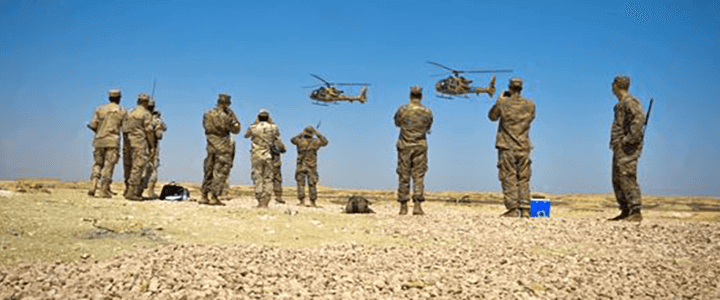Last Friday’s attack on a Sufi mosque in Egypt’s Sinai peninsula, which killed 305, including 27 children, and wounded another 128 worshipers, has drawn attention back to the Sinai. The Sinai is one of the dozens of countries where the U.S. has troops deployed or forward stationed, and has been since January 1982. But they’re not there to hunt for terrorists; they’re there to enforce the 1978 Camp David Accords that established peace between Israel and Egypt.
Keeping the peace since 1982
The Multinational Force and Observers is a 12-nation coalition established by the Egyptian-Israeli Treaty of Peace. The U.S., naturally, provides the largest contingent of soldiers for the mission, including an infantry battalion and a support group. Since 2002, the National Guard has provided around 440 troops at a time to the mission — more than 15,000 in total. In May, the 1st Battalion, 181st Infantry of the Massachusetts Army National Guard, along with other supporting Yankee Guardsmen, began a nine-month deployment, relieving the 2nd Battalion, 135th Infantry from Minnesota.
The MFO’s mission is “to supervise the implementation of the security provisions” of the treaty, “and employ best efforts to prevent any violation of its terms.” Soldiers mount patrols and man observation posts throughout the region to watch for violations of the treaty. In 2005, the mission was expanded to include monitoring of Egyptian border guards along the border with Gaza.
The troops have not been immune from the danger posed by Islamist radicals, though. In September 2015, four American soldiers were wounded by a roadside improvised explosive device, and in May 2016, another was shot in the arm in an attack on an MFO camp. But as peacekeepers, the troops are not authorized to engage the militants except in self-defense.
A troubled patch of desert
The Sinai Peninsula, the only part of Egypt in Asia, is a 23,000-square-mile triangular piece of land east of the Suez Canal and the Gulf of Suez, bordering Israel to the east. Israel occupied the land in 1956, and again after the 1967 Six-Day War. One of the reasons Egypt and other Arab countries launched the 1973 Yom Kippur War was to retake the peninsula. Syria attacked to retake the Golan Heights at the same time. Neither operation was successful, but in 1975, Israel agreed to withdraw from part of the Sinai and to reopen the Suez canal, while Egypt agreed to allow Israeli ships to pass through it.
One of the few foreign policy triumphs of the Carter Administration was brokering a peace treaty between Egypt and Israel during talks held at the president’s Camp David complex in Maryland. Egyptian President Anwar Sadat and Israeli Prime Minister Menachem Begin signed a deal that led to a formal peace treaty the following year and earned them the Nobel Peace Prize. The Egypt-Israeli Peace Treaty has been the basis of an enduring peace between the two countries ever since.
Sadat, however, paid the price for making peace with the world’s only Jewish state. On October 6, 1981, as the world watched on television, Egyptian soldiers loyal to the terrorist group Egyptian Islamic Jihad opened fire on Sadat during a military parade celebrating the 1973 war. Sadat and three others were killed, and 28, including Vice President Hosni Mubarak, were wounded in the attack. Mubarak went on the rule Egypt until falling in the 2011 Egyptian Revolution, which later led to the Muslim Brotherhood briefly holding power.


